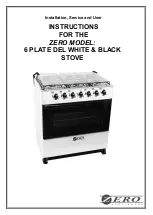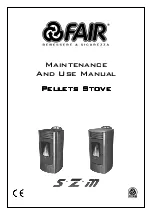
Draft conditions
The chimney‟s draft is the resulting effect within the flue caused by the difference in temperature
within the flue and the cooler temperature outside. Other factors that can influence the level of draft
include the length of the flue, insulation of the chimney, adverse weather conditions or tall buildings or
trees nearby the flue terminal.
Poor draft occurs when:
The atmospheric temperature difference is too low, e.g. a poorly insulated chimney. If the chimney
is excessively cool, it may help to „prime‟ the flue before the fire is lit. Just place a screwed-up
sheet of newspaper in the flue way of the stove and ignite.
The outside temperature is too high, e.g. during the summer months.
There is no air movement (wind) outside.
The chimney is not tall enough, with the result that the terminal sits in the lee of the roof surface or
in the vicinity of tall trees or neighboring buildings. These conditions are also associated with
downdraft where the flue gases are pushed back down the chimney.
Flue draft is diluted by residual air entering the chimney, e.g. due to inadequate fluepipe joints or
leaks at the cleaning door or flue collar.
Unsealed, unused fireplaces are connected to the chimney.
The flue is blocked, e.g. by soot, due to inadequate cleaning, loose debris or even a birds nest.
The room to which the stove is installed is too tightly sealed. (See section on Fresh air supply).
A good draft is achieved when:
The temperature difference between the flue way or chimney and outside atmosphere is high.
(Higher temperature in flue way or chimney and cooler temperature to external atmosphere). This
also applies during firing, when the need is greatest.
The weather is clear and there is a good wind.
The chimney is of the proper height, i.e. minimum 4 meters over the stove and the termination
adequately clear of the roof line.
The room that the stove is installed is adequately ventilated.
2.9 Handle
This stove is supplied with two handles for customer preference. One is a Bakelite handle & the other
is a stainless steel tube handle.
Handle assembly
This stove is assembled with one type of handle when manufactured. If your preference is to use the
other handle supplied then please refer to the handle assembly picture for instructions on how to
change. It is recommended that an approved five fingered heat proof glove of the correct size for each
users hand is used to operate this stove.










































